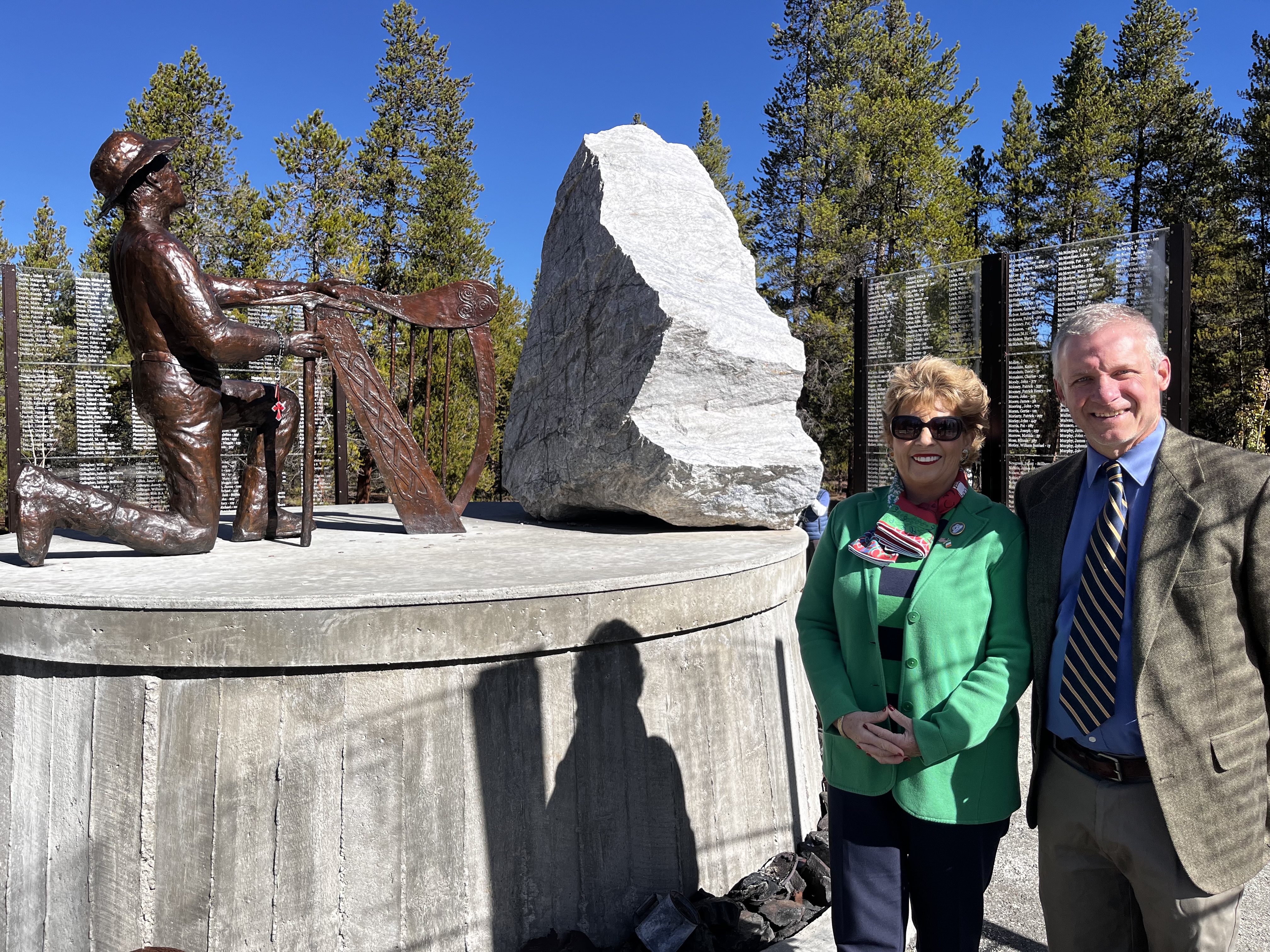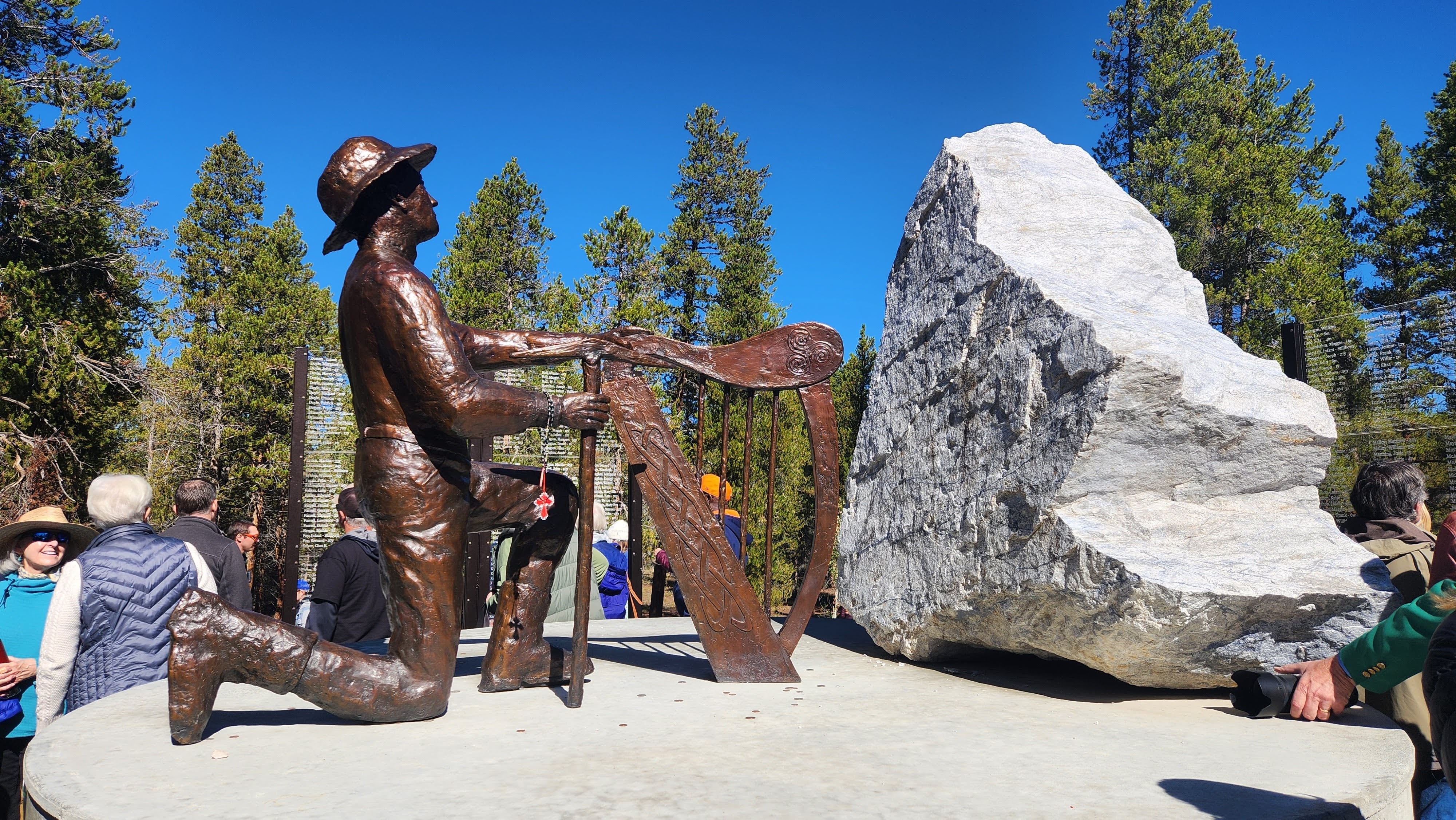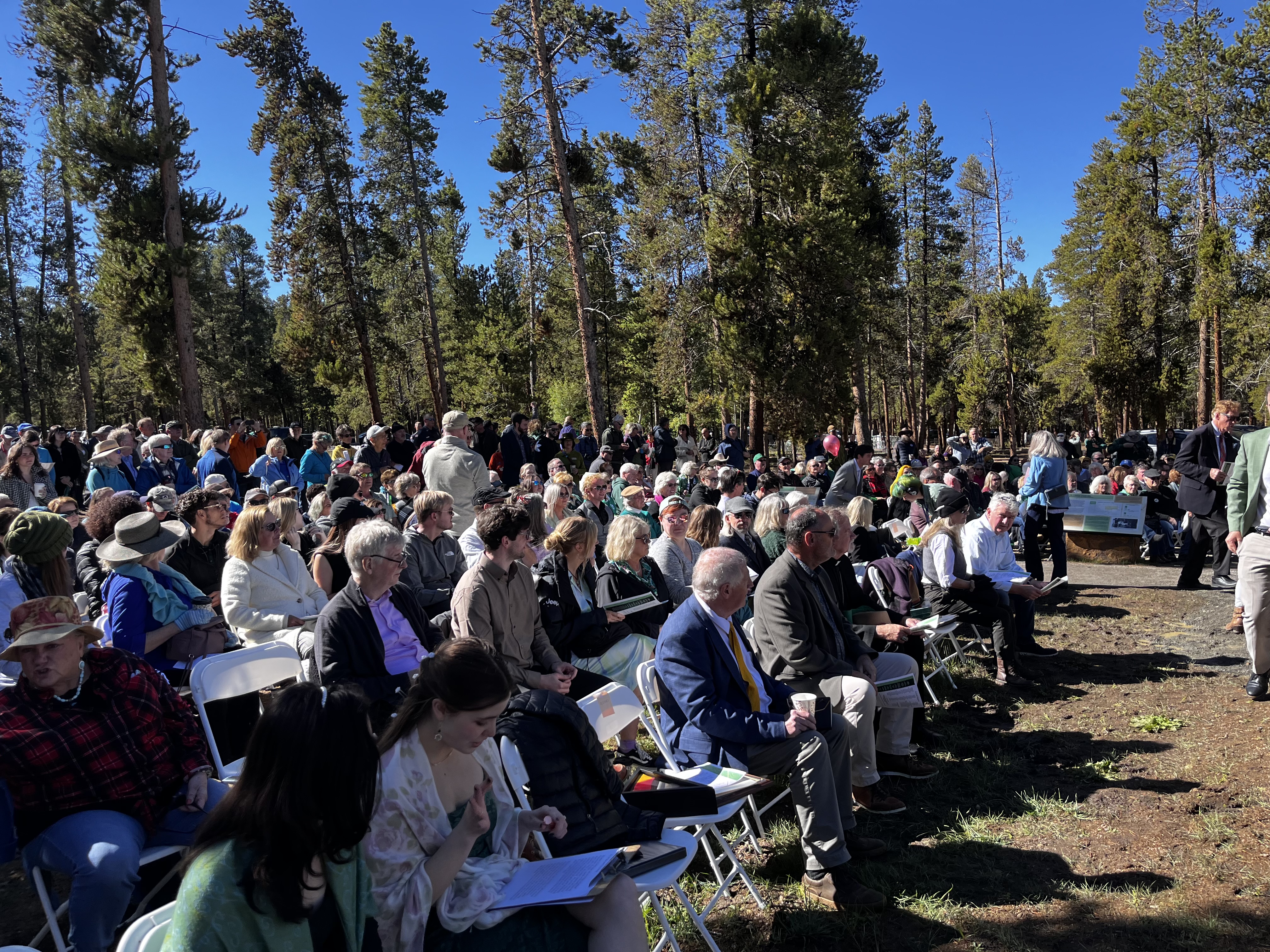
Story
A Letter to my Dad
These remarks were given by Jim Walsh at the unveiling of the Leadville Irish Miners' Memorial on September 16, 2023. He arranged his speech in the form of a letter to his father.
Dear Dad:
I wish you could be here today to witness this gathering. In a pine forest at 10,000 ft. hundreds have gathered from all over the world. We are seated a couple hundred feet away from the sunken graves of thousands of desperately poor people and their babies, immigrants from all over the world, and many who were starved out of Ireland. Dad, you taught me to love the Humble, those who as you put it, “don’t have a pot to piss in.” You called them the “Salt of the Earth,” and told your seven children that real wisdom only comes through suffering. You always had your kids deliver the rent check to the landlord’s house next door, ashamed that it was a week or two weeks late, and not wanting to see judgement on their faces. We loved going to their big house, happy to bring the check because they gave us popsicles and we were able to see sofas that were never used and shiny coffee tables.
Dad, we did it. Students, Descendants, the Irish Network, Kathleen Fitzsimmons, Luke Finken, Mayor Greg Labbe, Noel Hickey, and the Irish Government, are just some of those who deserve our thanks.
Today, we celebrate the completion of the memorial that was just an idea when you died. You won’t believe how this has grown and taken off. My work is on display at the Healy House here in Leadville and last night hundreds came to the opening reception, where I gave the Irish Ambassador a tour of my research. She said that we can “restore dignity” to those buried here. I felt joy as we read the speech that labor leader Michael Mooney gave the day after the 1880s strike started. He wrote, in response to attacks on the miners’ union, that if the silver kings can “pull the reins, we can pull tighter.”
You encouraged me, dad, beginning in 2000 when I had to choose a dissertation topic. At the time, we were digging up our own genealogy, learning that thirteen of our ancestors were exiled to North America during the Great Hunger, landing in Western Pennsylvania. Some were killed in train accidents and fires. They dug canals, cleaned the homes of the wealthy, scratched, clawed, and self-medicated. Over the phone one night, you said, “Jesus Jimmy, I’ll bet that many Irish made it all the way out there after the famine, maybe you should find them.” This suggestion led me to Leadville, in search of the Shanty Irish and the spirits of my own ancestors. My good friend Kathleen Fitzsimmons brought me here to the pauper graves in 2004, sensing that I needed to be in this space. That moment, as it slowly dawned on me that I was standing in the middle of a Potter’s Field, changed my life.
My dream is that people will understand why we chose to honor just the paupers. There are thousands of Irish buried in Leadville whose names are not on this memorial. We intentionally focused only on the transient, the desperate, the Shanty Irish and other paupers. This is a memorial that turns the world upside down for an instant; that we might see with new eyes the struggles of paupers today.
My dream is that people understand why we chose to include not just the Irish names, but all of the names in the Catholic Free section; that people might recognize that this is not just an Irish memorial but a memorial to the working class. To be Irish means to feel solidarity with other exiles, with other migrants, with other workers.

Jim Walsh and Irish Ambassador to the US Geraldine Byrne Nason at the Leadville Irish Miners Memorial.
You once asked me dad, what would the world look like with the poor on top. Well, I wish you were here to see it. You would be amazed. The names are illuminated at night, and the people are claiming the memorial, leaving items all around it, relics and artifacts and coins, gifts for the dead, telling them that we see them.
The day of the unveiling is Mexican Independence Day. The one name that will forever stay with me is unnamed in the records and in the cemetery. The entry simply reads “Unknown- Mexican- Killed on Railroad.” Today is Mexican Independence Day, but I feel like this is a Day of Liberation for Irish Americans. Buffeted by our economic comfort and status, in our suburban homes, we lost something vital, the tears of our shared past. These names and the sunken graves might just offer us our compassion again. We must look at the graves, the rows and rows of lost babies, the eleven Slavin babies all under the age of 3, the Flannerys who lost 7 children to epidemics.
Before you died, you asked me is we were going to honor the Indigenous who were pushed out of this region. We have, Dad. Cassandra Atencio, the Cultural Director of the Southern Ute Nation could not be here today, but she blessed this ground for us before any construction began, reminding us of indigenous children in unmarked graves.
You would have said to me “Jimmy, you should quote Mother Jones in your speech.” I will dad. She once said, “Pray for the dead, but fight like hell for the living!” We have the pray-for-the-dead part down, but what does it mean to fight like hell for the living? For you dad, it always meant speaking up for migrants and refugees everywhere, particularly those who are undocumented.
For you, dad, it meant those who are unhoused, living on the streets, refusing to blame them for their situation and instead pointing up the economic ladder instead of down.
For you, dad, it meant workers who are exploited and not paid a living wage, applauding their efforts to organize and revive the American labor movement.

The centerpiece of the Leadville Miners' Memorial depicts a man with a pick, kneeling at an Irish harp.
Dad, all of these names lead me to other names, others who have died recently and lie in unmarked graves in deserts and mountains and at sea. Here are a handful of the names that I found in my research:
Josseline Quinteros, Mexico, 14, died and buried in Arizona desert
Jose Ortiz Aguillone, Honduras, 51, died in Arizona desert
Aminitou Diallou, N. Africa, 25, died in Mediterranean Sea en route to Europe
Becky Moses, Nigeria, 26, died in Mediterranean Sea en route to Europe
Marun Adeba, 2, Iraq, froze to death in refrigerated truck while trying to reach Greece from Turkey
At Ludlow Dad, they died from bullets and kerosene. In Leadville, they died from poverty and disease. Like Ludlow, this is now a sacred space for workers, as the names on these glass panels struggled to organize some of the first unions. As workers today fight like hell all over this country for a dignified wage so that their children do not have to deliver the rent checks late, this memorial honors workers everywhere.
Today, dad, we set this space free to be what it is, to challenge us, to nudge us toward reflection, to question the economic structures around us. Pray for the dead, but fight like hell for the living.
With deep love and solidarity,
Your Son Jimmy

